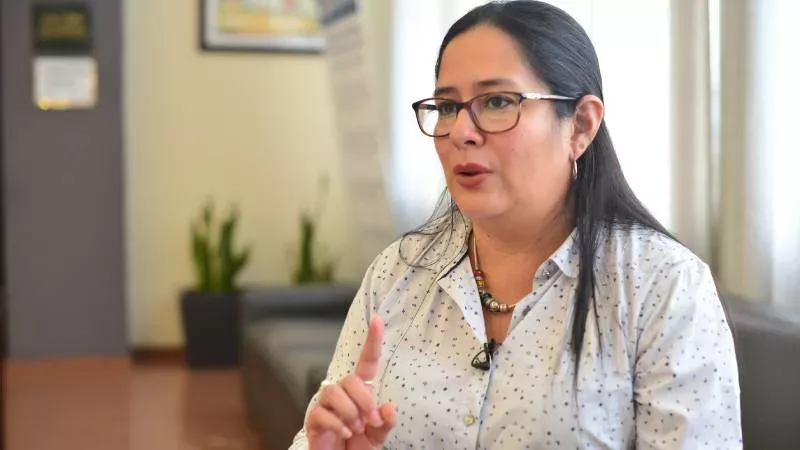Ruth Eleonora López, an expert in electoral law and director of the Anti-Corruption and Justice Unit of Cristosal, analyzes the gaps and problems that will imply for the Supreme Electoral Tribunal (TSE) to implement the Special Law for the Exercise of Suffrage from Abroad in 2024.
The specialist points out some complexities of the law. She highlighted how difficult it would be to identify the nationals interested in voting abroad and the use of technology for overseas voting.
What should be given more attention in the Overseas Voting Law?
“There are several elements to which attention must be paid; among these are the mechanisms to verify the identity of Salvadorans who will vote and the allocation of votes to the San Salvador constituency.”
In order of priority, what problems do you visualize with the regulations?
“If I had to list one by one problem, I would start with who are the people who can vote… are they the Salvadorans residing abroad, or are they the Salvadorans abroad? It’s not the same thing.”
Besides this, do you see other complications in this regulation?
“The other big problem is the issue of technology; electronic voting has different modalities, there are not many companies in the world that are dedicated to providing technology for elections, but there are. One thing is the technology through machines that will be used for face-to-face voting, and another is the technology of internet voting that represents challenges such as the secrecy of the vote, such as the unity of the electoral act, because the law enables you to vote for 30 days before the day of the election.”
What does this represent?
“In terms of security, it is a very high risk, but it also gives an ease to those who will have it easier, because it is not the same to enable a voting center for three days because only one place is established and the distances are longer than to give 30 days to those who can do it with a click.”
And with this, is the secrecy of the vote guaranteed?
“Technology also represents a problem of the secrecy of the vote, the security and integrity of the process. A bank transaction is not the same as the violation of an electoral system because what is being violated is not a vote; it is the will of the community. So, that is another challenge for the Tribunal.”
How do you see the allocation of votes for deputies from the capital?
“Another problem the law has is the allocation of votes to San Salvador of all those who vote with a passport or who have an address abroad, and this manipulates the allocation of seats.”
Ruth López señala: Ley del Voto Exterior plantea riesgo de suplantación de identidades en elección 2024
Ruth Eleonora López, experta en derecho electoral y directora de la Unidad Anticorrupción y Justicia de Cristosal, analiza los vacíos y problemas que implicará para el Tribunal Supremo Electoral (TSE) implementar la Ley Especial para el Ejercicio del Sufragio desde el Exterior en el 2024.
La especialista señala algunas complejidades de la ley, entre las que destacó lo difícil que será identificar a los connacionales interesados en votar en el extranjero y la utilización de tecnología para el voto exterior.
¿A qué se le debe poner más atención en la Ley del Voto Exterior?
“Hay varios elementos a los que hay que prestarle atención, entre estos están los mecanismos para verificar la identidad de los salvadoreños que van a votar y la asignación de votos a la circunscripción de San Salvador.”
En orden de prioridad, ¿qué problemas visualiza con la normativa?
“Si yo tengo que enumerar uno a uno los problemas empezaría por quiénes son las personas que pueden votar… ¿son los salvadoreños que residen en el exterior o son los salvadoreños en el exterior? No es lo mismo.”
Además de esto ¿usted ve otras complicaciones en esta normativa?
“El otro gran problema es el tema de la tecnología, voto electrónico hay diferente modalidades, no hay muchas empresas en el mundo que se dediquen a suministrar tecnología para elecciones, pero sí hay. Una cosa es la tecnología a través de máquinas que se va a utilizar para el voto presencial y otra es la tecnología del voto por internet que representa desafíos como la secretividad del voto, como la unidad del acto electoral, porque la ley le habilita a que vote por 30 días antes del día de la elección.”
¿Qué representa esto?
“En temas de seguridad es un riesgo altísimo, pero además se le da una facilidad a quien más fácil lo va a tener, porque no es lo mismo habilitar un centro de votación por tres días, porque se establece un solo lugar y las distancias son largas, que darle 30 días a quien puede hacerlo con un clic.”
¿Y con esto se garantiza la secretividad del voto?
“La tecnología además representa un problema de la secretividad del voto, la seguridad y la integridad del proceso. No es lo mismo una transacción bancaria, que la vulneración de un sistema electoral, porque lo que ahí se está vulnerando no es un voto, es la voluntad de la colectividad. Entonces, ese es otro de los retos que tiene el Tribunal.”
¿Cómo ve que la asignación de votos sea para diputados de la capital?
“Otro de los problemas que tiene la ley es la asignación de votos a San Salvador de todas aquellas personas que voten con pasaporte o que tienen dirección en el exterior y esto lo que hace es una manipulación en la asignación de escaño.”

